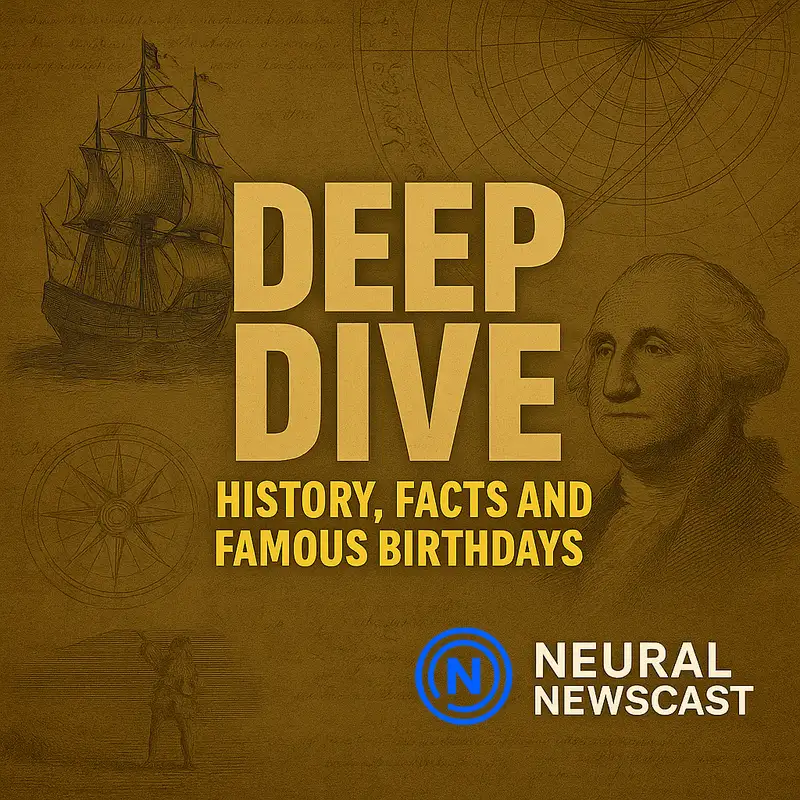Deep Dive: Galveston’s Storm, Richard the Lionheart, and the Long Story of 'Literally' - September 8, 2025
The News You Need, powered by AI and reviewed by humans.
Welcome to Neural Newscast.
Get ready for a deep dive from Neural Newscast.
I'm Jason, your business specialist, and Sophia, your lifestyle correspondent,
is here with me as we delve into today's subjects.
On this day in 1900, Hurricane Force winds up to 120 miles per hour struck the Texas Gulf Coast,
killing more than 6,000 people and all but destroying the city of Galveston.
That single line carries such weight, thousands of lives lost and a city nearly wiped out.
It's staggering to picture winds that strong tearing through daily life.
From a strategic perspective, the scale of destruction reshaped how communities viewed risk and infrastructure.
A catastrophe like that forces industries and local governments to reorder priorities.
It also reframes daily living.
When you hear, all but destroying the city of Galveston,
you feel the trauma, the rebuilding, and the routines people had to reinvent.
And that kind of sustained 120 miles per hour force isn't just heavy rain.
It rips apart buildings, ports, supply lines, the entire economic base of a city.
The human toll isn't an abstract statistic.
Families, neighborhoods, the rhythm of a place, suddenly gone.
The social fabric needed enormous care to stitch back together.
In business terms, when a city is almost destroyed, markets, trade routes, and shipping,
every commercial thread connected to Galveston face immediate collapse and long-term uncertainty.
Which means recovery isn't just physical rebuilding.
It's restoring trust, public health, and daily routines so people believe their lives can be sustainable again.
That concise account captures both the meteorological ferocity and the profound economic and human consequences.
Exactly the dual reality planners have to address.
Hearing it that way, you can feel the urgency and the grief in one sentence.
It's a powerful reminder of how vulnerable coastal communities are.
It also explains why events like this sit at the center of conversations about planning and resilience.
A clear call to learn and adapt.
And on a personal level, it's a nudge toward community preparedness, the neighbors, networks, and civic structures that matter when everything else fails.
By any measure, the storm was catastrophic, and its imprint on Galveston and on how we think about resilience has lasted.
A concise but deeply affecting snapshot of a pivotal moment in the city's history, and one that still teaches.
Time for a quick pause. We'll explore more when Neural Newscast's deep dive returns.
Shifting gears, today we celebrate the birthdays of Richard I of England,
1157, Antonin Dvorak, 1841, and Peter Sellers, 1925.
I love that lineup. Royalty, a composer, and a comedian. What a range.
Jason, which one are we drilling into today?
Let's focus on Richard I of England, 1157.
His reign from 1189 to 1199 and his crusader reputation
have strategic and cultural ripple effects worth unpacking.
Absolutely, Richard the Lionheart.
His military leadership during the Crusades is the headline, but the human details matter
too.
His persona fueled chivalric ideals and storytelling for centuries.
Right, and his long absences while campaigning had governance implications.
Delegated authority, stretched crown finances and openings at home that shaped the monarchy's
evolution.
That tracks.
The romantic image can mask administrative strain.
Yet his bravery and chivalry became almost a brand, influencing how later monarchs and
nobles presented themselves, yes?
Exactly.
His legend worked as soft power, a template for royal valor that short up legitimacy even
when day-to-day rule was contested.
a pattern we see in institutional myth-making.
And culturally, that template matters.
The Lionheart's image fed literature, ballads, and modern media,
turning his life into a symbol of courage and nobility people still reference.
There's an economic angle too.
Crusading required massive funding, taxation, loans, and then ransom.
His capture and release hit royal finances hard
and reshaped fiscal practices for successors.
That ransom detail feels like a novel plot, but the costs were very real.
It humanizes him and shows how heroic reputations often sit atop messy realities.
Long-term, his military reputation and the institutional responses to his absences
nudged the English crown toward more sophisticated governance mechanisms.
So his legacy is twofold.
The inspiring legend that endures in culture,
and the practical strains that pushed governmental evolution
powerful in different ways.
And that duality shows why Richard I matters beyond biography.
Individual leadership choices ripple through institutions and public perception.
It also invites us to update what we celebrate today.
Bravery and sacrifice, yes, alongside accountability and sustainable leadership.
We'll be right back after this short break.
Thanks for listening to NNC Neural Newscast.
This is Chad Thompson, the founder of Neural Newscast.
If you want to go deeper, we've got more stories and context waiting for you at our website,
neuralnewscast.com.
Welcome back to Neural Newscast Deep Dive.
Let's continue our exploration.
The word, literally, has been used figuratively for over 200 years.
unexpectedly rich, so it's not a recent slang shift.
It's a centuries-old usage that shows how language evolves.
From a business perspective, that longevity signals semantic flexibility,
shaping everything from brand messaging to how contracts and policies are interpreted.
And in everyday conversation, it means people have stretched that word for emphasis for generations,
not just in modern casual speech.
It also explains why style guides clash.
Prescriptive rules often ignore historical patterns that have persisted for two centuries.
It makes me rethink the misuse complaints.
Knowing it's been figurative for over 200 years gives the word a certain cultural legitimacy.
Exactly.
And when companies craft copy, that history helps balance clarity with the natural speech patterns consumers expect.
So whether someone says, I literally died laughing, or sticks to the strict meaning,
both live inside a tradition that's more than two centuries old.
That continuity is a strategic insight.
Meaning's shift, but durable patterns become part of our shared understanding and shape communication norms.
Comforting. Really. Language has flexed like this for centuries, so today's debates are just the newest chapter in a very old story.
That's all for this Neural Newscast deep dive. On behalf of Jason and me, Sophia, thanks for listening.
This has been another Neural Newscast production.
Join us again soon and visit endnewscast.com to explore today's news as well as the past like never before.
Neural Newscast integrates real and AI-generated voices to facilitate efficient, high-quality news production.
Developed by human experts, our AI-generated content undergoes rigorous fact-checking and human review before publication.
While we strive for accuracy and neutrality, AI-generated content may occasionally contain errors.
We encourage listeners to verify crucial details from reliable sources.
For more on our AI transparency practices, visit newscast.com.
Creators and Guests


